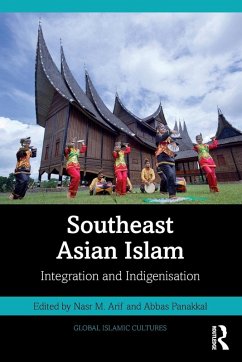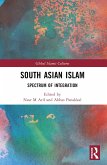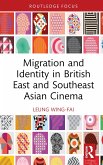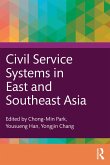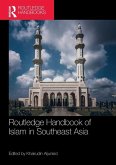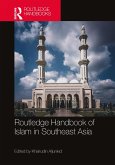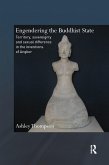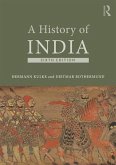Southeast Asian Islam
Integration and Indigenisation
Herausgeber: Arif, Nasr M.; Panakkal, Abbas
Southeast Asian Islam
Integration and Indigenisation
Herausgeber: Arif, Nasr M.; Panakkal, Abbas
- Broschiertes Buch
- Merkliste
- Auf die Merkliste
- Bewerten Bewerten
- Teilen
- Produkt teilen
- Produkterinnerung
- Produkterinnerung
This book explores Muslim communities in Southeast Asia, the integration of Islamic culture with diverse ethnic cultures of the region and practice of cultural and religious coexistence in various realms.
Andere Kunden interessierten sich auch für
![South Asian Islam South Asian Islam]() South Asian Islam64,99 €
South Asian Islam64,99 €![Migration and Identity in British East and Southeast Asian Cinema Migration and Identity in British East and Southeast Asian Cinema]() Wing-Fai LeungMigration and Identity in British East and Southeast Asian Cinema75,99 €
Wing-Fai LeungMigration and Identity in British East and Southeast Asian Cinema75,99 €![Civil Service Systems in East and Southeast Asia Civil Service Systems in East and Southeast Asia]() Civil Service Systems in East and Southeast Asia58,99 €
Civil Service Systems in East and Southeast Asia58,99 €![Routledge Handbook of Islam in Southeast Asia Routledge Handbook of Islam in Southeast Asia]() Routledge Handbook of Islam in Southeast Asia47,99 €
Routledge Handbook of Islam in Southeast Asia47,99 €![Routledge Handbook of Islam in Southeast Asia Routledge Handbook of Islam in Southeast Asia]() Routledge Handbook of Islam in Southeast Asia194,99 €
Routledge Handbook of Islam in Southeast Asia194,99 €![Engendering the Buddhist State Engendering the Buddhist State]() Ashley ThompsonEngendering the Buddhist State45,99 €
Ashley ThompsonEngendering the Buddhist State45,99 €![A History of India A History of India]() Hermann Kulke (University of Kiel)A History of India74,99 €
Hermann Kulke (University of Kiel)A History of India74,99 €-
-
-
This book explores Muslim communities in Southeast Asia, the integration of Islamic culture with diverse ethnic cultures of the region and practice of cultural and religious coexistence in various realms.
Hinweis: Dieser Artikel kann nur an eine deutsche Lieferadresse ausgeliefert werden.
Hinweis: Dieser Artikel kann nur an eine deutsche Lieferadresse ausgeliefert werden.
Produktdetails
- Produktdetails
- Global Islamic Cultures
- Verlag: Taylor & Francis Ltd
- Seitenzahl: 320
- Erscheinungstermin: 19. April 2024
- Englisch
- Abmessung: 234mm x 156mm x 17mm
- Gewicht: 478g
- ISBN-13: 9781032699257
- ISBN-10: 1032699256
- Artikelnr.: 69434028
- Herstellerkennzeichnung
- Libri GmbH
- Europaallee 1
- 36244 Bad Hersfeld
- gpsr@libri.de
- Global Islamic Cultures
- Verlag: Taylor & Francis Ltd
- Seitenzahl: 320
- Erscheinungstermin: 19. April 2024
- Englisch
- Abmessung: 234mm x 156mm x 17mm
- Gewicht: 478g
- ISBN-13: 9781032699257
- ISBN-10: 1032699256
- Artikelnr.: 69434028
- Herstellerkennzeichnung
- Libri GmbH
- Europaallee 1
- 36244 Bad Hersfeld
- gpsr@libri.de
Nasr M. Arif is Visiting Professor at St Andrews University, UK, and Professor of Political Science at Cairo University in Egypt. He served as Professor of Islamic Studies and founding Executive Director of the Institute for Islamic World Studies at Zayed University, UAE. His works have been published in Arabic and translated into English, Spanish, Hungarian, Kurdish, Persian, and Urdu. His research concentrates on Islamic traditions and political thought, the history of Islamic cultures, political development, and comparative political systems. He received a PhD degree in political science (1995), Cairo University, Egypt, and the University of Maryland, College Park, USA. Abbas Panakkal is a historian currently affiliated with the School of History, University of St Andrews, UK. He serves as a member of the advisory board for the Religious Life and Belief Centre at the University of Surrey, UK. Panakkal is presently engaged in a research project that explores the diverse processes of integration and indigenization within vernacular communities. He holds the position of Director at the Ibn Battuta International Centre of Intercultural Studies and is also Director of the International Interfaith Initiative. In the past, he was a fellow at Griffith University in Australia. His research encompasses a wide range of subjects, including language, religion, law, indigenization, integration, interreligious engagements, and intercultural cooperation.
List of figures vii
List of contributors viii
Introduction: Southeast Asian Islam - Integration and indigenisation 1
Nasr M. Arif and Abbas Panakkal
PART I
Theology, Jurisprudence, and Traditions 11
1 Arrival, adoption, and adaptation: integrating Islam in maritime
Southeast Asia 13
Carool Kersten
2 Living sunna: scholars, community leaders, and the integration of Islam
in Java 37
Ismail Fajrie Alatas
3 Islamic jurisprudence and adat in Southeast Asia 61
R. Michael Feener
4 Integration of South Asia within Southeast Asian traditions 86
Abbas Panakkal
PART II
State and Society 119
5 Integration of Islam into the Malay and Bugis-Makassar kingdoms 121
Muhamad Ali
6 Muslim women's dress in Southeast Asia: Islamic law, fashion, and
national identity 143
Euis Nurlaelawati and Nina Mariani Noor
7 Muslim cosmopolitanism in Southeast Asia: marketplaces as sites of
interaction and integration 167
Khairudin Aljunied
PART III
Architecture, Arts, and New Cultures 187
8 Cultural adaptation and integration: Islam in Southeast Asia 189
Anthony Reid
9 Pondok education, public discourse, and cultural pluralism in Malaysia
and Indonesia 208
Azmil Tayeb
10 The Islamic art of Southeast Asia 234
Robert Hillenbrand
11 The mosques of Southeast Asia: a narrative of representation and
negotiation 263
Tutin Aryanti
Index 290
List of contributors viii
Introduction: Southeast Asian Islam - Integration and indigenisation 1
Nasr M. Arif and Abbas Panakkal
PART I
Theology, Jurisprudence, and Traditions 11
1 Arrival, adoption, and adaptation: integrating Islam in maritime
Southeast Asia 13
Carool Kersten
2 Living sunna: scholars, community leaders, and the integration of Islam
in Java 37
Ismail Fajrie Alatas
3 Islamic jurisprudence and adat in Southeast Asia 61
R. Michael Feener
4 Integration of South Asia within Southeast Asian traditions 86
Abbas Panakkal
PART II
State and Society 119
5 Integration of Islam into the Malay and Bugis-Makassar kingdoms 121
Muhamad Ali
6 Muslim women's dress in Southeast Asia: Islamic law, fashion, and
national identity 143
Euis Nurlaelawati and Nina Mariani Noor
7 Muslim cosmopolitanism in Southeast Asia: marketplaces as sites of
interaction and integration 167
Khairudin Aljunied
PART III
Architecture, Arts, and New Cultures 187
8 Cultural adaptation and integration: Islam in Southeast Asia 189
Anthony Reid
9 Pondok education, public discourse, and cultural pluralism in Malaysia
and Indonesia 208
Azmil Tayeb
10 The Islamic art of Southeast Asia 234
Robert Hillenbrand
11 The mosques of Southeast Asia: a narrative of representation and
negotiation 263
Tutin Aryanti
Index 290
List of figures vii
List of contributors viii
Introduction: Southeast Asian Islam - Integration and indigenisation 1
Nasr M. Arif and Abbas Panakkal
PART I
Theology, Jurisprudence, and Traditions 11
1 Arrival, adoption, and adaptation: integrating Islam in maritime
Southeast Asia 13
Carool Kersten
2 Living sunna: scholars, community leaders, and the integration of Islam
in Java 37
Ismail Fajrie Alatas
3 Islamic jurisprudence and adat in Southeast Asia 61
R. Michael Feener
4 Integration of South Asia within Southeast Asian traditions 86
Abbas Panakkal
PART II
State and Society 119
5 Integration of Islam into the Malay and Bugis-Makassar kingdoms 121
Muhamad Ali
6 Muslim women's dress in Southeast Asia: Islamic law, fashion, and
national identity 143
Euis Nurlaelawati and Nina Mariani Noor
7 Muslim cosmopolitanism in Southeast Asia: marketplaces as sites of
interaction and integration 167
Khairudin Aljunied
PART III
Architecture, Arts, and New Cultures 187
8 Cultural adaptation and integration: Islam in Southeast Asia 189
Anthony Reid
9 Pondok education, public discourse, and cultural pluralism in Malaysia
and Indonesia 208
Azmil Tayeb
10 The Islamic art of Southeast Asia 234
Robert Hillenbrand
11 The mosques of Southeast Asia: a narrative of representation and
negotiation 263
Tutin Aryanti
Index 290
List of contributors viii
Introduction: Southeast Asian Islam - Integration and indigenisation 1
Nasr M. Arif and Abbas Panakkal
PART I
Theology, Jurisprudence, and Traditions 11
1 Arrival, adoption, and adaptation: integrating Islam in maritime
Southeast Asia 13
Carool Kersten
2 Living sunna: scholars, community leaders, and the integration of Islam
in Java 37
Ismail Fajrie Alatas
3 Islamic jurisprudence and adat in Southeast Asia 61
R. Michael Feener
4 Integration of South Asia within Southeast Asian traditions 86
Abbas Panakkal
PART II
State and Society 119
5 Integration of Islam into the Malay and Bugis-Makassar kingdoms 121
Muhamad Ali
6 Muslim women's dress in Southeast Asia: Islamic law, fashion, and
national identity 143
Euis Nurlaelawati and Nina Mariani Noor
7 Muslim cosmopolitanism in Southeast Asia: marketplaces as sites of
interaction and integration 167
Khairudin Aljunied
PART III
Architecture, Arts, and New Cultures 187
8 Cultural adaptation and integration: Islam in Southeast Asia 189
Anthony Reid
9 Pondok education, public discourse, and cultural pluralism in Malaysia
and Indonesia 208
Azmil Tayeb
10 The Islamic art of Southeast Asia 234
Robert Hillenbrand
11 The mosques of Southeast Asia: a narrative of representation and
negotiation 263
Tutin Aryanti
Index 290

